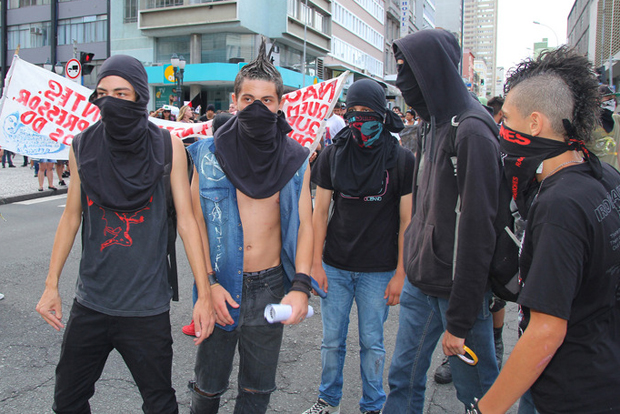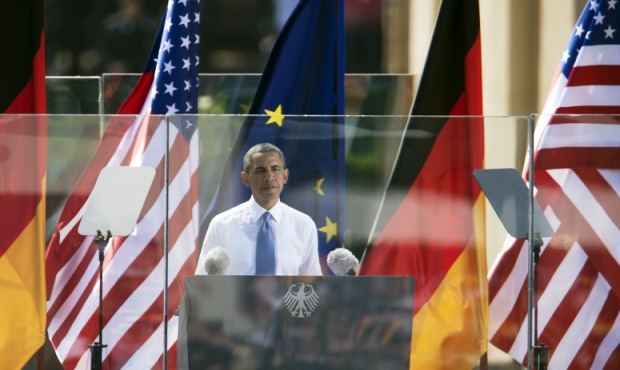Index relies entirely on the support of donors and readers to do its work.
Help us keep amplifying censored voices today.
[vc_row][vc_column][vc_column_text]
As you know, we British are very fond of tea. Today, I am going to look at three Ts:
The over-arching questions here are what is the democracy we want and what is the technology we want to achieve that?
In other words, how can we make it happen?
Long, long ago sometime in the 1990s I went to the BT Lab in Ipswich where they were developing the house of the future, where the washing machine talked to you and you could talk to everything. Then the lab guys said, it will be great, we’ll know what you are wanting to buy and when it’s on sale or you are out of it someone will phone you and tell you.
Ugh, that sounds creepy, I said. No, they said, it will be great.
And so it came to pass, only it wasn’t the phone that called but social media and the internet that knew what I wanted and the phone call was a pop-up ad. And I still think it is creepy.
Because the only person I want to know whether I am out of milk, or I want to buy a new bed, is ME.
One friend even told me that Google knew he had Multiple Sclerosis before he did. As ads for the MS Society keep popping up when he was online, and after a while he began to wonder why.
Right now Google is hoovering up our data, who we email, what we search for, what we want to buy. Not just Google, but Facebook, Instagram, Twitter and entertainment companies like Netflix and the BBC line up a list of programmes they know we want to watch even though we haven’t even heard of them yet.
They are offering to take decisions away from us, by letting them do it. It’s tough out there, so may we choose you a book, a film, a life, a friend who agrees with you, and pretty soon you won’t realise other choices have been taken away.
But actually in many ways this is nothing new. In 2006-10 I worked for a think tank that was pretty close to the government of the time, and it was well known that when Number 10 wanted to know what people were thinking, buying, feeling, —– a societal snapshot if you will —– they talked to the supermarkets, because back then the supermarkets were seen as the leaders in data collection. They knew if more people were buying rom coms, spending less on the weekly shop or stocking up on tins because they thought there might be a crisis.
Back then, and now, supermarkets were gathering data from loyalty cards, then Google, Facebook and others realised we would give loads of information about ourselves to them for free, if they created something we wanted. So they did.
It was our choice. We chose free email, when paid was an option. Other alternatives were, and are available. We choose a search engine that tracks our data. We chose to add our date of birth, photos, and holiday details to Facebook. Handing it over without question.
Do you remember reading one of those terms and conditions apply documents for the first time, and realising you were giving an app the opportunity to read your emails and look at your photos? I do. But people happily signed up and got stuff for free. And the deal was on.
And why is this a democratic issue? The thing is in a democracy we had and have a responsibility to make decisions, as well as to be informed and to be represented.
And in democracies we need to decide more, rather than have decisions thrust upon us. In giving away our data we didn’t realise that all that information would be collated into huge data banks, where people could work out things, like this person with a car is far more likely to vote for Trump than this person who uses public transport. And from there, all those people with cars would be targeted with messages before the US election. And all this data analysis about what people did with their lives would be used to target people with messages in the run up to the Brexit referendum.
Transparency in a democracy means what the impact of our decisions are. I also want to know what the government is doing on my behalf. And I want transparency from companies operating in my country that may have impact on my democracy. I want to trust that the political system is working, and that is not being driven by shadowy figures and ideas that are hidden from view.
So transparency of who we ALLOW to access our data, and having a personal contract with companies saying what they can and can’t do MUST be part of our future democracies.
We also need more transparency about what political parties in an election period are saying to voters. In previous decades we knew what arguments were being made to different parts of the electorate because we saw the billboards or the TV ads or the newspapers advertising, or the interviews.
But what we are seeing increasingly used in the run up to elections is hidden messages, hidden politicking.
The electoral bodies need to catch up with those digital leaps and make some changes to what is allowed in election periods. I am going to argue that each campaign — needs to lodge one example of each message/campaign with them, whether they are on Facebook or on the side of the road, so those that don’t receive them know about them, and are able to discuss and debate whether there is any truth or value in them. In the UK the Electoral Commission needs to make changes so parties can not use hidden tactics. There will be hurdles and opposition, but a system needs to work, in the same way, we used to be able to see an ad, we should then be able to access at least on the Electoral Commission, for instance, each major campaign that a party is running, giving others the chance to fact check or oppose it.
Because a democracy should be a noisy, open society where there is disagreement and argument and there is space to do so.
Transparency breeds more trust, and that’s something that politicians and political systems need in order to operate. If no one believes in the system then it fails.
Democracy must supply its own terms and conditions, ones that create structure for rights and responsibilities, both for its citizens and for corporations operating within it.
These include paying tax, living within the laws of the land, and supporting its essential freedoms.
We do not want to hand over the right to choose what we are allowed to see or read or hear to unelected Silicon Valley corporations. We should not be happy with governments that try to do just that, and suggest that massive California-based companies should be selecting news or views for us. We should make those choices ourselves.
At Index, we have already heard of videos being taken down showing Rohinga Muslims being persecuted, after pressure from the Burmese government — what this does is attempts to undermine evidence gathering by human rights organisations. We hear of numerous issues where the Chinese government attempts to stop its citizens from having access to books and articles and news items on the internet, often by pressurising digital media from publishing them. These are governments pressurising social media and digital companies to censor or restrict access, but in other nations governments seem to want to hand over those decisions to social media, rather than reviewing the law and going through a democratic process.
And back to those terms and conditions that come with apps and other tools, sometimes these run to as many as 30,000 words — the size of a small book — that is not a document designed for people to read or understand. Simple, straightforward contracts need to replace this culture of hidden meanings, designed to mystify and mislead.
We should know what we are signing up for, with our new era of democracy and the technology that goes with it.
We need tech that works to help us be informed, be curious, to connect, and of course we should remember that these tools do exist for good, but they can also be misused to surveil and suppress.[/vc_column_text][/vc_column][/vc_row][vc_row][vc_column][vc_basic_grid post_type=”post” max_items=”4″ element_width=”6″ grid_id=”vc_gid:1541429193469-bf25f4e9-3ba3-6″ taxonomies=”5641″][/vc_column][/vc_row]
[vc_row][vc_column][vc_video link=”https://youtu.be/fW_rl97IupM”][vc_column_text]MuckRock is a non-profit, collaborative news site used by journalists, activists and members of the public to request, receive and share government documents from any agency that is subject to transparency laws in the United States. Their aim is to make policies more open to the public, and democracies further informed.
“MuckRock has continued to double in size each year,” said MuckRock. “We hope to continue increasing our impact, putting cutting edge transparency tools in the hands of journalists, whistleblowers, researchers and ordinary people to have impact at the national, international, and local levels.”
The site, which has a user base of 10,000, hosts an archive filled with hundreds of thousands of pages of original government materials, as well as information about how to file requests, and tools to make the requesting process easier. MuckRock has filed over 40, 000 requests, shedding light on government surveillance, censorship and police militarisation among hundreds of other issues. The site’s staff and contributors use the documents received through the site to create original investigative reporting and analysis.
MuckRock filed and won a lawsuit against the CIA, which resulted in the release of 13 million pages of previously secret documents from the CREST Database – the CIA’s database of declassified information dating back through the Cold War. The foundation also fought off a lawsuit from multinationals seeking to hide security flaws in their smart metering technology.
Their work investigating the US government’s 1033 programme, which supplied local police and the private prison system with military equipment, helped lead to major reforms of these policies.
Stories that MuckRock have reported on over the past year include: gaps in gun violence data, surveillance footage from the top of the Smithsonian building on inauguration day – contributing to the debate of the true crowd size, and classified CIA documents that were left stashed in the Rockefellers barn.
After he had been in office for over a year, MuckRock investigated the effects of president Trump’s harsher immigration policies, and found that the number of deportations was actually decreasing, while the number of people held in detention centres was rising.
The site has had a particularly successful 2017, seeing its 10,000th public records request successfully completed. They also celebrated International Right To Know day by expanding their reach to Canada, which is ranked a lowly 49th out of 111 countries on the RTI Rating.

The site has also focused on expanding its education about requesting documents, and produced a Freedom of Information Act 4 Kidz lesson plan to help educators to start discussions about government transparency.
“It’s impossible to quantify the impact of this acknowledgement of our amazing transparency community,” said MuckRock. “This nomination recognizes the important work of all the MuckRock users who have fought to open up government on so many issues, often facing bureaucratic hurdles and legal threats to create a strong civic society for all.”
See the full shortlist for Index on Censorship’s Freedom of Expression Awards 2018 here.[/vc_column_text][/vc_column][/vc_row][vc_row full_width=”stretch_row_content” equal_height=”yes” el_class=”text_white” css=”.vc_custom_1490258749071{background-color: #cb3000 !important;}”][vc_column width=”1/2″][vc_custom_heading text=”Support the Index Fellowship.” font_container=”tag:p|font_size:28|text_align:center” use_theme_fonts=”yes” link=”url:https%3A%2F%2Fwww.indexoncensorship.org%2Fsupport-the-freedom-of-expression-awards%2F|||”][vc_column_text]
By donating to the Freedom of Expression Awards you help us support
individuals and groups at the forefront of tackling censorship.
[/vc_column_text][/vc_column][vc_column width=”1/2″ css=”.vc_custom_1521479845471{background-image: url(https://www.indexoncensorship.org/wp-content/uploads/2017/05/2017-awards-fellows-1460×490-2_revised.jpg?id=90090) !important;background-position: center !important;background-repeat: no-repeat !important;background-size: cover !important;}”][/vc_column][/vc_row][vc_row][vc_column][vc_basic_grid post_type=”post” max_items=”4″ element_width=”6″ grid_id=”vc_gid:1523523704690-32d26e8d-1852-3″ taxonomies=”10735″][/vc_column][/vc_row]

In Curitiba, about 300 protesters took to the streets of the central city asking for more health and safety improvements in the country and against the hosting of the World Cup 2014 in Brazil. (Image: João Frigério / Demotix)
On 8 January, residents in Rio’s Metrô-Mangueira favela, were greeted by government representatives, set to demolish houses and evict residents. A demonstration was led then by the residents to fight their removal, but once again violence broke out between the police and the protestors, with police firing rubber bullets into crowds.
Rio On Watch said: “Having evicted long-time residents to public housing units without any public consultation over the use of land – required by local legislation – the city left the land and houses to be occupied by those in most desperate need of public housing.” These “desperate” residents are now being forced out and given no alternative housing, despite promises from mayor Eduardo Paes that nobody would be left homeless.
The demonstration in the Metrô favela, is emblematic of the current mood all across Brazil. Triggered by a hike in already expensive bus fares, 2013 saw Brazil’s biggest protest movement for over 20 years, in what became known as the “V for Vinegar” movement or the “Salad Revolution”. More than two million protestors took to the streets to fight against issues such as government corruption, poor social services and a rise in the cost of living. Right at the heart of the movement however, was a feeling of alienation and exclusion from the decision making process for the preparations of the 2014 World Cup.
According to the United Nations Human Rights Council, in the context of the implementation of sporting mega events, all UN states must, “ensure full transparency of the planning and implementation process and the meaningful participation of the affected local communities therein”. However this transparency is not happening in Brazil as authorities bulldoze favelas, and replace them with car parks and shopping centres.
A report by the National Coalition of Local Committees for a People’s World Cup and Olympics said: “Supported by a twisted notion of ‘public interest’, the Brazilian state has systematically refused to establish horizontal dialogues with civil society groups and threatened communities.”
In many cases residents learn of their evictions through the media before government communications. This was true for the residents of Vila Autódromo in Rio, who first learned of their proposed eviction through the front page of the O Globo newspaper on 4 October 2011.
In other cases, residents are told by authorities that their properties must be demolished because of alleged structural risks. Three hundred homes were identified for demolition because of such “structural risks” in Pavão-Pavãozinho, but residents have been waiting since July 2011 for authorities to provide evidence of such risks. This is a further example of the Brazilian government failing to offer their citizens information or ensure political transparency.
The government has established two bodies to organise the World Cup, which exist outside the normal political structure. The 2014 World Cup Steering Committee and the Committee Responsible for Host Cities liaise with FIFA, the federal government and advisory bodies mostly comprised of private companies. Decisions made by these bodies are not discussed with the public, and information regarding plans is excluded from the general population.
In Curitiba, the population unanimously opposed the council’s decision to give £22.5m to the private construction of the João Américo Guimarães Stadium. However requests for information were denied and there was no public participation in the council’s decision.
The example of the João Américo Guimarães Stadium, is typical of the wider situation whereby the government is spending billions of dollars on the construction of infrastructure and stadiums without giving the people a say in the matter. The Arena da Amazônia stadium in Manaus has cost £151m, while The Economist estimates that the Brazilian government has already spent £1.9 billion on World Cup stadiums collectively.
Marcelo Pelligrini, a journalist from São Paulo told Index on Censorship: “This is a huge stadium [Arena da Amazônia] because of the standards of FIFA, but after the World Cup we have no use for this stadium, and after the tournament it will probably become a jail.”
“The main point in Brazil is the use of these millionaire stadiums. That is what the population is complaining about. They are spending half a billion reias on a stadium that has no use after the World Cup, and we have no good transportation, no health insurance, we have nothing,” Mr Pelligrini said.
The World Cup is not benefiting the Brazilian people, according to Pelligrini: “We have great stadiums, but no good services.” He also felt that the Brazilian people were not being given democratic representation in the decision making process.
Denied a say in the preparations for the World Cup, the Brazilian people flocked to the streets in 2013, to protest against the way the government has been organising the tournament. The protests were driven by a multitude of building grievances, but a feeling that the democratic process had broken down, and the voice of the Brazilian people was being ignored, was at the heart of the demonstrations. Protestors held banners proclaiming, “FIFA go home”, “We don’t need the World Cup, we need money for hospitals and education” and “World Cup for whom?”
These sentiments epitomise the zeitgeist of the Brazilian nation, and their feeling that the World Cup has only benefited the few, while he vast majority are excluded from the decisions and thus the benefits.
The recent protest in the Metrô-Mangueira favela underlines how these grievances are ongoing. The image of residents clashing once more with riot police depicts the ultimate breakdown in communications and democracy in the lead-up to the biggest, and supposedly most unifying, football tournament in the world.
This article was posted on February 10 2014 at indexoncensorship.org
From America to Azerbaijan, leaders have pledged themselves to a new era of openness and transparency. So why are whistleblowers and journalists still punished, asks Mike Harris

Is Barack Obama committed to transparency? (pic Gonçalo Silva/Demotix)